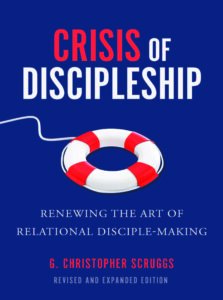 This week, my blog introduces the just-published revised and expanded version of Crisis of Discipleship. I became a Christian in 1977 in a small group in Houston, Texas. At the time, I was a young corporate attorney. During those years, I was an active layperson and small group leader of one kind or another while trying to put my faith at work in a secular calling. In 1991, Kathy and I left Houston and the practice of law and attended seminary. While in seminary, we were active in small group discipling. From 1994 until 2019, I pastored three congregations ranging from relatively small to large. Each congregation had a small group discipling ministry. The practical suggestions of Crisis of Discipleship flow from all those years of work and ministry.
This week, my blog introduces the just-published revised and expanded version of Crisis of Discipleship. I became a Christian in 1977 in a small group in Houston, Texas. At the time, I was a young corporate attorney. During those years, I was an active layperson and small group leader of one kind or another while trying to put my faith at work in a secular calling. In 1991, Kathy and I left Houston and the practice of law and attended seminary. While in seminary, we were active in small group discipling. From 1994 until 2019, I pastored three congregations ranging from relatively small to large. Each congregation had a small group discipling ministry. The practical suggestions of Crisis of Discipleship flow from all those years of work and ministry.
Preparing a New Version of Crisis of Discipleship
Since 2017, I have been writing, publishing, and revising my reflections on making disciples in the challenging environment of contemporary culture. The results of this work are embodied in Crisis of Discipleship: Renewing the Art of Relational Disciple Making in a revised and expanded format published by Living Dialog Ministries.
The book is available at https://livingdialog.org/product/crisis and other venues. Living Dialog has sacrificially assisted in this reprint, and I hope you will attempt to buy them directly from Living Dialog. I have included the new cover so that you will be able to purchase the latest version. You can see the book at LivingDialog.org. The book is also available on Amazon and other sources. Be sure to purchase the Revised and Expanded Version. The older version with a different cover is still available from some sources.
A set of editable PowerPoint slides is available for pastors and teachers free of charge, enabling leaders to teach this as a series of lessons with minimal preparation. I am also most willing to create a Study Guide for anyone who needs it. The editability of the slides assures that teachers can customize the lessons for their congregation.
I hope that Crisis of Discipleship will help leaders of local congregations take practical steps to prioritize disciple-making in local churches. A pastor, friend, and mentor constantly reminded me that the church is never more than a generation from extinction. Making disciples in the challenging environment of post-Enlightenment America and Europe will take the concerted effort of many people. I hope you will read this book and consider giving it to your local church leadership.
The Material Covered
The book is both theoretical and practical, with the practical aspect predominant. It begins with an analysis of our culture. It ends with a glimpse into the future, reflecting upon why we must develop a relational discipleship strategy. The book does not take sides regarding various theological or denominational differences, trying to be fair to everyone and valuable to any congregation that would like to develop a better strategy for discipling people.
I have reproduced the Table of Contents below so that you can easily see what is to be learned through studying the book:
Part 1: Come and Follow Me
Chapter 1: The Blessed Life
Chapter 2: Life in the Ruins
Chapter 3: Costly Discipleship
Chapter 4: The Way of a Christ-Follower
Chapter 5: The Way of Relationship
Part 2: Live and Love Like Christ
Chapter 6: Sharing Christ’s Life
Chapter 7: Sharing Good News
Chapter 8: Sharing Your Testimony
Chapter 9: Sharing in Dialogue
Chapter 10: Living a Different Way of Life
Part 3 Being a Disciple in a Fragmented Age
Chapter 11: The Way of Prayer
Chapter 12: The Way of the Word
Chapter 13: The Way of Service
Chapter 14: Growing in Transformational Community
Chapter 15: Discipleship in an Age of Fragmentation
Conclusion
Crisis of Discipleship represents the lessons of almost fifty years of Christian discipleship as a lay leader and pastor. As the “Boomers” (my generation) move to the sidelines, a new generation of leadership is emerging. Crisis of Discipleship hopes to help those in active ministry and those emerging into leadership as they seek to find ways to meet the challenges of our culture. No one, least of all me, has all the answers. Nevertheless, many people have found ways to reach out to American and Western cultures—and many new ideas have been proposed. I hope that many leaders and laypersons will find a way to begin thinking through their own response to our culture in Crisis of Discipleship.
This has been a labor of love and, hopefully, a way to share my walk with Christ with others in a helpful way. I hope friends, pastors, church leaders, and others will appreciate it.
God bless you all,
